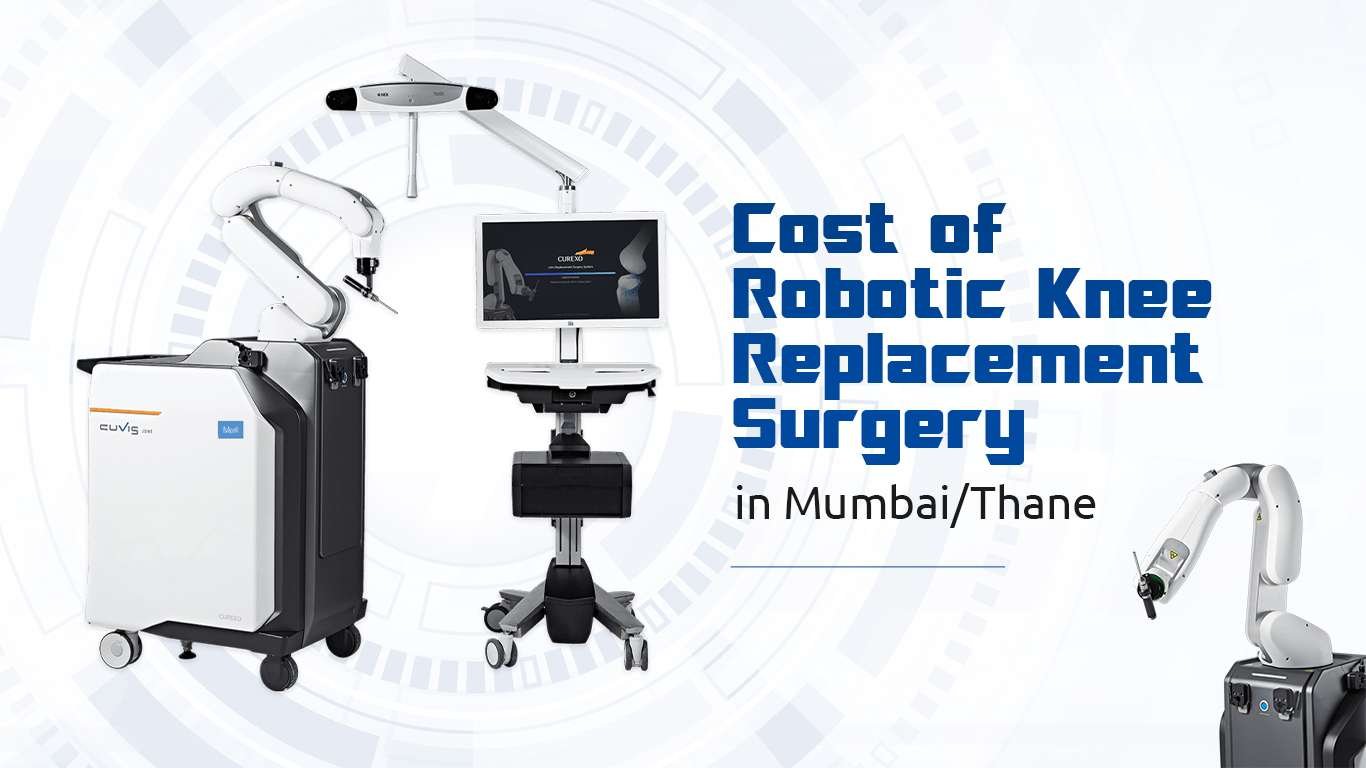

Knee replacement surgery is a complex and significant medical procedure aimed at alleviating pain and improving the quality of life for individuals suffering from severe knee joint issues. When we considering the factors of Robotic Knee Replacement Surgery Cost in Thane, several key elements come into play.
Firstly, the choice of hospital or medical facility significantly impacts the overall cost. Reputed hospitals with state-of-the-art facilities tend to charge higher fees for the surgery. Surgeon expertise and experience also play a vital role, with experienced surgeons often charging more for their services.

The type of knee replacement procedure selected, whether it’s total knee replacement, partial knee replacement, or minimally invasive techniques or Robotic Knee Replacement Surgery , can influence the costs. Additionally, the quality and type of implant used in the surgery can significantly impact the final bill.
Other cost factors include pre-surgery tests, post-operative care, rehabilitation, and medication expenses. The patient’s overall health condition and any complications during the procedure may also add to the total cost.
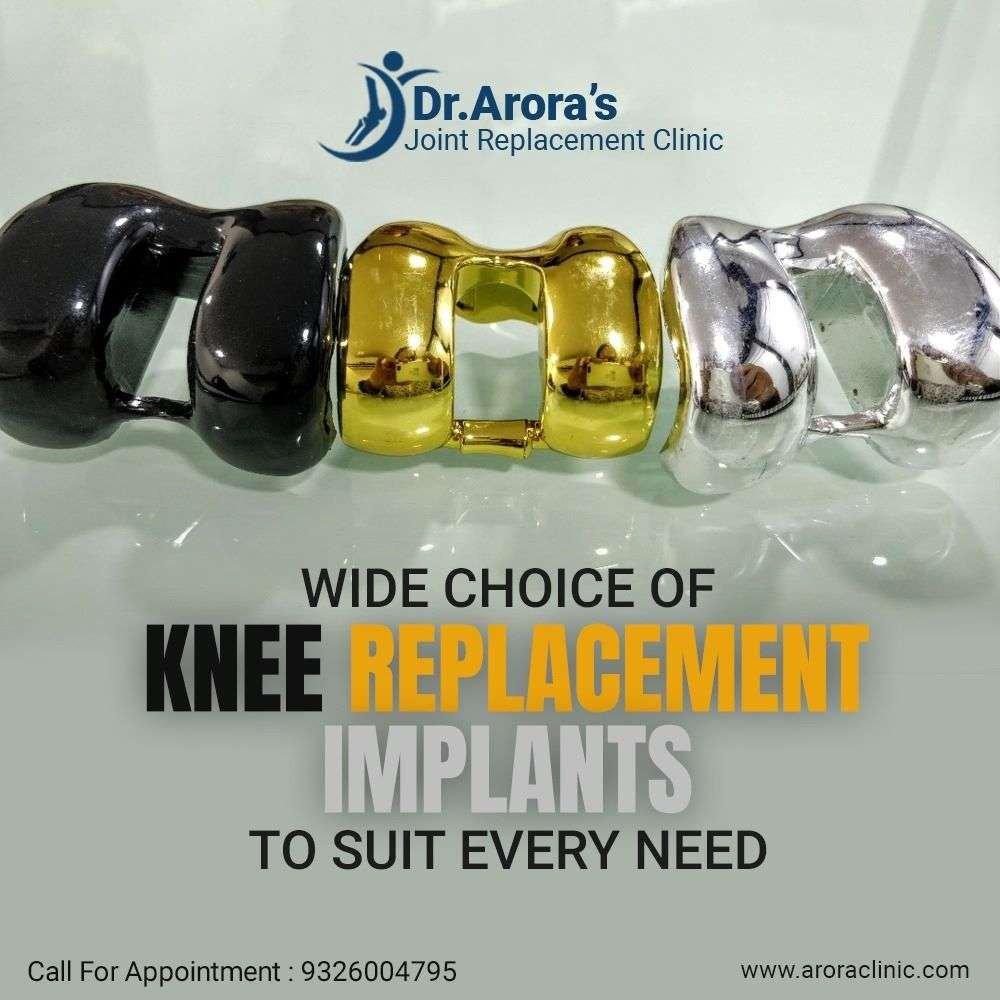
The cost of knee implants can vary depending on several factors, including the materials used. Silver implants, while not commonly used in knee replacements, may be more expensive due to the rarity and high cost of silver. Gold implants, although extremely rare, would likely be the most expensive option due to the high value of gold. On the other hand, titanium-made implants are commonly used and offer a good balance between cost and performance.
Titanium is durable, lightweight, and biocompatible, making it a popular choice. Factors such as manufacturing processes, design complexity, and additional features can also contribute to the overall cost of knee implants.
Total knee replacement surgery and partial knee replacement surgery are both viable options for patients suffering from knee joint issues, but they differ significantly in terms of costs.
Total knee replacement is generally more expensive due to its extensive nature.
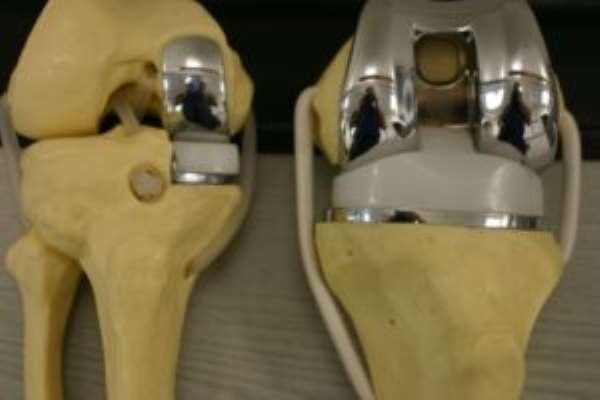
The procedure involves replacing the entire knee joint with prosthetic components, which requires sophisticated implants and longer hospital stays. Additionally, patients may need more post-operative rehabilitation and follow-up care, further adding to the overall expense.
On the other hand, partial knee replacement is a less invasive procedure, targeting only the damaged part of the knee joint. This approach results in reduced surgical and hospitalization costs compared to total knee replacement. Moreover, partial knee replacements often have a shorter recovery period, leading to potential savings in rehabilitation expenses.
Ultimately, the choice between the two procedures should be based on the individual’s condition, preferences, and budget, as the costs are just one aspect of the decision-making process.

The cost of robotic knee replacement surgery can be influenced by various factors, including the type of hospital room chosen for the procedure. Hospital room choices typically range from standard wards to private rooms with enhanced amenities. Opting for a private room generally incurs higher expenses due to increased comfort and personalized care. These rooms often offer added benefits such as increased privacy, more space, better furnishings, and improved amenities.
Consequently, patients who choose private rooms during robotic knee replacement surgery may expect higher overall costs compared to those who opt for standard wards. It’s important for patients to consider their preferences and budgetary constraints when deciding on the type of hospital room for their surgery.
The cost of robotic knee replacement surgery can vary depending on the location of the hospital. Factors such as the local cost of living, healthcare infrastructure, and regional market dynamics can influence the pricing. In general, hospitals located in metropolitan areas or regions with higher living expenses may have higher surgical costs. Conversely, hospitals in rural or less affluent areas might offer more affordable options.


The cost of robotic knee replacement surgery can be influenced by changes in hospital aggregations. Hospital aggregations refer to the process of hospitals joining larger networks or systems. When hospitals become part of larger networks, they can benefit from economies of scale and enhanced bargaining power with suppliers, which can potentially lead to cost savings. These savings may be passed on to patients in the form of lower surgical costs.
Additionally, hospital aggregations can facilitate the adoption of advanced technologies, such as robotic-assisted surgery, which can improve surgical outcomes and reduce complications. However, it is important to note that the actual cost of robotic knee replacement surgery may vary based on factors such as geographical location, hospital reputation, and the specific robotic system used.

The cost of robotic knee replacement surgery can vary depending on the patient’s medical condition. Factors such as the severity of knee damage, presence of complications, and overall health of the patient can impact the cost. Patients with complex medical conditions may require additional pre-operative tests, specialized implants, or longer hospital stays, resulting in higher costs. Surgeons may also need to adjust the surgical approach and use additional resources to ensure a successful outcome.

Therefore, the cost of robotic knee replacement surgery can differ based on the specific medical condition of each patient.
Wondering about the Robotic Knee Surgery cost near me? At Arora Clinic in Thane, we provide transparent and competitive pricing for robotic knee surgery. Our state-of-the-art robotic technology ensures precision, faster recovery, and excellent outcomes. Learn more about the cost and benefits of robotic knee surgery at Arora Clinic.
Dr. Bakul Arora is a Consultant Joint Replacement & Orthopaedic Surgeon in Thane. He is currently practicing in Arora Clinic. He specialises in Mini-invasive techniques which offer multiple benefits to patients. He does the surgery using Subvastus approach for Knee Replacement surgery and Direct Anterior Approach for Hip replacement Surgery . This new techniques has many advantages for patients.Surgical Advantage of Minimally Invasive Knee Replacement Surgery.
Dr. Bakul Arora’s Joint Replacement Clinic is also known as “Arora Clinic” which is located at Hiranandani Meadows in Thane, within a very convenient proximity to Mumbai. Arora Clinic dedicated clinic for Knee Replacement surgery and all kinds of Orthopaedic treatments and surgeries
The Arora Clinic is one of the most advanced Orthopaedic clinic in Thane region and dedicated to providing the best, personalised healthcare with a breadth of surgical and medical expertise. Arora Clinic offers the modern surgical treatments like “Minimally Invasive Knee Replacement Surgery” which is also called as “PAIN-LESS SURGERY” for any complex knee diseases.
Dr. Bakul Arora is well experienced in treating common knee conditions such as ligament injuries, anterior knee pain, patella instability, meniscal tears, swollen knee and tendonitis. He specialises in Mini-Invasive Techniques which offer multiple benefits to patients. Contact us for further information on Robotic Knee Replacement Surgery.
Robotic surgery offers several advantages for knee replacement. The precise nature of robotic technology allows for improved implant alignment, reduced tissue damage, and potentially faster recovery times. This can lead to better outcomes and enhanced patient satisfaction.
While robotic knee surgery has numerous benefits, there are a few potential disadvantages. These may include higher costs compared to traditional surgery, the need for specialized training for surgeons, and limitations in complex cases where manual intervention might be required. It is essential to discuss these factors with your surgeon to determine the best approach for your specific situation.
The duration of robotic knee surgery can vary depending on several factors, including the complexity of the case and the surgeon’s experience. On average, the procedure itself typically takes between 1 to 3 hours. However, it is important to note that additional time may be required for pre-operative preparations and post-operative recovery.
The cost of robotic knee replacement can vary depending on various factors, including the geographical location, the hospital or clinic chosen, the type of implant used, and other associated expenses such as anesthesia and post-operative care. It is advisable to consult with healthcare providers or hospitals in your specific area to get accurate cost estimates.
Like any surgical procedure, robotic surgery carries certain risks. However, robotic-assisted procedures have demonstrated improved precision and accuracy, potentially reducing risks compared to traditional open surgery. It is important to discuss the potential risks and benefits with your surgeon to make an informed decision based on your individual circumstances.
Robotic knee surgery offers several advantages, including improved implant alignment, reduced tissue damage, smaller incisions, potentially faster recovery times, reduced pain, and improved range of motion. The robotic system provides surgeons with enhanced visualization and precision, leading to better surgical outcomes and potentially improved long-term functionality.
Robotic surgery offers several advantages over traditional open surgery. These include smaller incisions, reduced blood loss, less post-operative pain, lower risk of infection, faster recovery times, and improved cosmetic outcomes. The precision and accuracy of robotic technology allow surgeons to perform complex procedures with enhanced control and visualization, leading to better outcomes for patients.
We are really honored to receive this and we will continue to serve the society better than ever We aim to provide the world-class Knee/Hip Replacement Surgical (Minimal Invasive Surgery) treatment to every patient suffering from knee or hip pain and at the same time make their life pain-free and happy.
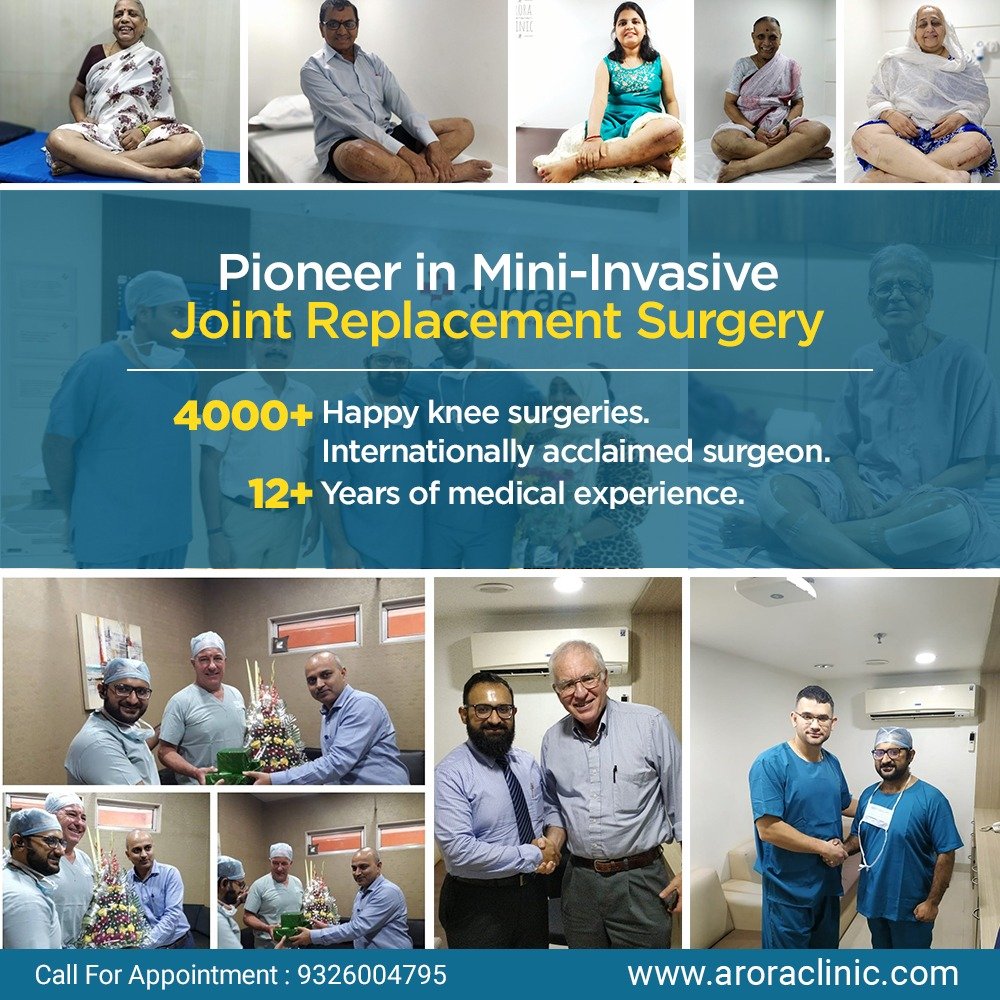
Dr. Bakul Arora’s Joint Replacement Clinic is also known as “Arora Clinic” which is located at Hiranandani Meadows in Thane, within a very convenient proximity to Mumbai. Arora Clinic dedicated clinic for Knee Replacement surgery and all kinds of Orthopaedic treatments and surgeries
The Arora Clinic is one of the most advanced Orthopaedic clinic in Thane region and dedicated to providing the best, personalised healthcare with a breadth of surgical and medical expertise. Arora Clinic offers the modern surgical treatments like “Minimally Invasive Knee Replacement Surgery” which is also called as “PAIN-LESS SURGERY” for any complex knee diseases.
Dr. Bakul Arora is a Consultant Joint Replacement & Orthopaedic Surgeon is one of the leading Knee Replacement Surgeon in Thane and Mumbai with over 4000+ successfully surgeries. Dr. Bakul Arora specialises in Mini-invasive techniques which offer multiple benefits to patients. He does the surgery using Subvastus approach for Knee Replacement surgery and Direct Anterior Approach for Hip replacement Surgery . This new techniques has many advantages for patients like its pain-less , stich-less surgery, patients walks on the same day after surgery, no blood loss, faster recovery etc.


Knee replacement is required for advanced arthritis of the knee joint, producing painful limitation of movements and restriction in activities of daily living. Knee replacement as a solution should be offered when all non–surgical methods of treatment failed and painkiller medicines and injections also failed to reduce the Knee and hip pains.
Knee replacement can be total or unicondylar, depending on the number of compartments involved. Among the total knee replacement, there are two popular designs- Cruciate Retaining, and Posterior Stabilized. The decision for the design is best taken by the operating orthopedic surgeon based on the integrity of ligaments. Patella resurfacing as a routine is a debatable subject.
Yes, most knee replacement surgeries are minimally invasive, with numerous benefits to the patient, including smaller incisions, less tissue trauma, bleeding and post–operative pain, shorter hospital stays, faster recovery, and earlier return to work and activities — in weeks rather than months. Advantages of Minimally Invasive Knee Replacement Surgery. Patients Start walking in few hours of surgery. Patients start climbing the staircase from second day of his surgery. Patients Discharge with in 3 Days from the Hospital after surgery. No blood loss during the surgery, no blood Transfusion required. Less Physiotherapy.( No Physiotherapist required for home) Less Antibiotic. Stitchless Surgery. Recovery time is just two – three week.
Bilateral knee replacement in the same sitting, can be performed if both the knee joints are damaged to the same extent, however, the medical condition of the patient, and bone quality must be kept in consideration.
Surgery through Minimally Invasive technique patients start walking on the same day and staircase climbing starts from the second day of surgery. Patients can resume his work after 3 – 4 week.
The most significant risks include Infection, Deep vein thrombosis,and Aseptic loosening of implants. The risks correlate with the co-morbid medical condition, and must be discussed with the patient before surgery.
Patients normally require hospitalization for 3-4 days in single knee replacement, and up to 5-6 days in both knee replacement surgery
A single knee replacement takes approximately 90 min- 2 hours. Both knee replacement surgery takes approx 2-3 hours.
Years ago, knee replacement surgery was reserved for elderly patients due to a high complication rate and lack of implant durability. Modern techniques have allowed orthopaedic surgeons to base surgical decisions on a patient’s pain and disability, and not necessarily chronological age. Most patients who undergo knee replacement are between the ages of 50 and 80, but surgeons evaluate patients individually and primarily on their physiologic age and demands.
Patients can resume his/her light work after discharge from the hospital, no need for rest.
Patients are given epidural anesthesia for surgery, and post op pain relief. They are expected to follow instruction from physiotherapist regarding muscle training.
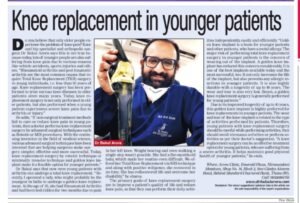

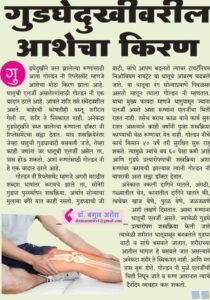

⇒ Wockhardt Hospital Mumbai Central, Mira road & Vashi
⇒ Apollo Spectra Hospital, Tardeo and Chembur
⇒ Cloud 9 Hospital, Malad
⇒ Criticare Hospital, Andheri
⇒ Arora Clinic, Hiranandani Meadows
⇒ Bethany Hospital, Vasant Vihar
⇒ Currae Hospital, Kapurbawdi
⇒ Horizon Hospital, Ghodbunder
⇒ Infinity Hospital, Majiwada
⇒ Lakecity Hospital, Khopat
⇒ Oscar Hospital, Majiwada
⇒ Drone Hospital, Bhiwandi
WhatsApp us